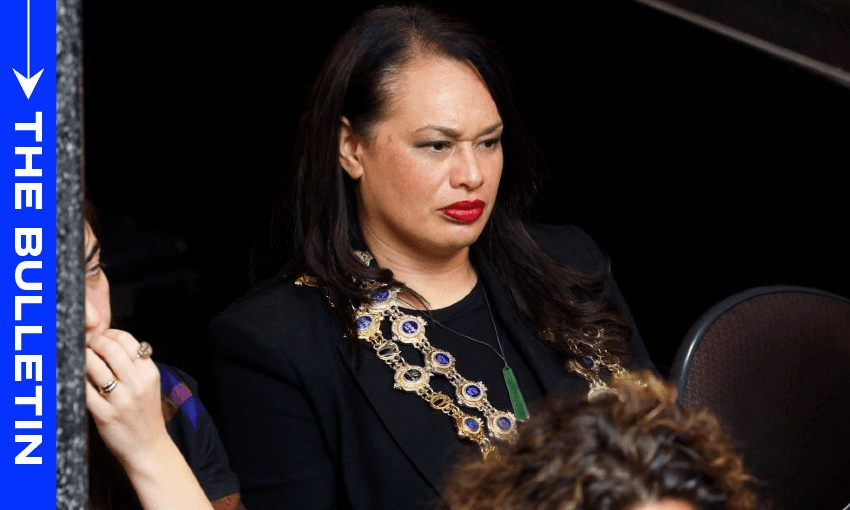Tory Whanau says she wasn’t overly surprised the government followed through with its threat to intervene at Wellington City Council, explains Stewart Sowman-Lund in this extract from The Bulletin.
To receive The Bulletin in full each weekday, sign up here.
Capital punishment
Little over a week after the threats first started, during an otherwise pretty standard interview with finance minister Nicola Willis on Newstalk ZB, the government has confirmed it will indeed appoint a Crown observer to Wellington Council. As reported by Stuff, local government minister Simeon Brown said yesterday that he was concerned about the ability of Wellington City Council to amend its long-term plan, something that will be required as a result of a failed vote to sell off the council’s stake in Wellington Airport. “Following advice from officials I have identified there is a significant problem at Wellington City Council that warrants the government appointing a Crown observer,” Brown said.
If you missed the backstory as it was developing, we talked about it last Wednesday. While the council has been in the government’s firing line for some time – from largely exaggerated suggestions it was spending large on “white elephant” projects instead of focusing on critical infrastructure, through to the hyperbole over the impact of cycle ways on the city – it was the airport vote that broke the camel’s back. All eyes now turn to how the council will respond, and whether other local councils could face similar wrath.
‘We need assistance’
Wellington mayor Tory Whanau, reported The Post’s Thomas Manch, has responded politely to the government’s announcement and said she and the council will work “constructively” with whoever is appointed as observer. “I wasn’t overly surprised at the decision to bring in an observer, based on sentiments expressed,” she told media. “And I wasn’t fighting this decision.”
The mayor’s lack of surprise that intervention has been ordered likely points to that ongoing narrative or “vibe”. Stuff’s Glenn McConnell noted that Wellington Council could be a victim of “political proximity” given it is close to parliament, reporters and “draped in politics”. Last weekend’s edition of Mediawatch on RNZ argued compellingly that the media had ramped up the urgency around government action at the council (indeed, the headline used for last week’s Bulletin featured in Colin Peacock’s report). While the predicted outcome has ultimately eventuated, Peacock’s report accurately noted that focus on Wellington – and Whanau – has been severe for much of this council’s tenure.
Where Whanau did push back, however, was around the broader narrative of dysfunction at the council, particularly around funding for water infrastructure. “We need assistance, not punching down,” said Whanau. As Interest’s Dan Brunskill pointed out, there remains some confusion as to what the Crown observer will suggest when it comes to the need to pay for these types of projects, with Simeon Brown appearing to say that the city should take on more debt to fund water service upgrades as opposed to relying on rate revenue.
Opening the flood gates?
Labour’s Chris Hipkins, reported RNZ’s Giles Dexter, expressed concern that if this was the government’s threshold for stepping in, “you won’t find many councils left that don’t end up with some kind of intervention”. Victoria University’s Dean Knight had similar thoughts, arguing Simeon Brown had engineered “an apparent significant problem” at the council.
Those words could ring true for the Otago Regional Council that has this week had the government block its vote on implementing tougher environmental rules, reported Newsroom Pro’s Fox Meyer (paywalled). The government yesterday passed an amendment preventing any councils from enacting new freshwater plans until a new National Policy Statement can be developed, which Labour’s Rachel Brooking described as a “specific attack on the Otago Regional Council”. Prior to the decision, as the Otago Daily Times reported, councillor Alexa Forbes said the intervention would make a “nonsense” of any idea that the council had local decision-making independence.
Earlier in the week, a paywalled report from the Times included comment from Labour Taieri MP Ingrid Leary, who described the government as riding “roughshod over process and rules”, including at the Wellington council. “It strikes me there could be an agenda to create a perception of chaos at the Otago Regional Council by some members to try to prompt government intervention,” Leary said.
Meanwhile, down the road…
It wasn’t just Wellington Council in the firing line yesterday: two members of parliament also made headlines for their roles in separate stories. Former Green MP turned independent Darleen Tana was formally ousted from parliament, telling 1News’ Maiki Sherman in an exclusive interview that it was something of a relief to finally learn her fate. Tana maintains she had no part in the allegations of migrant exploitation levelled at her husband’s business and told Sherman that’s part of the reason she fought to stay an MP. “Show me the evidence where I have done something wrong,” she said.
Meanwhile, the issue of National MP Andrew Bayly still isn’t going away. The embattled minister fronted to reporters at parliament where he once again reiterated his apology and said that while the “general tenor” of the complaint against him was accurate, he did not recall swearing.

